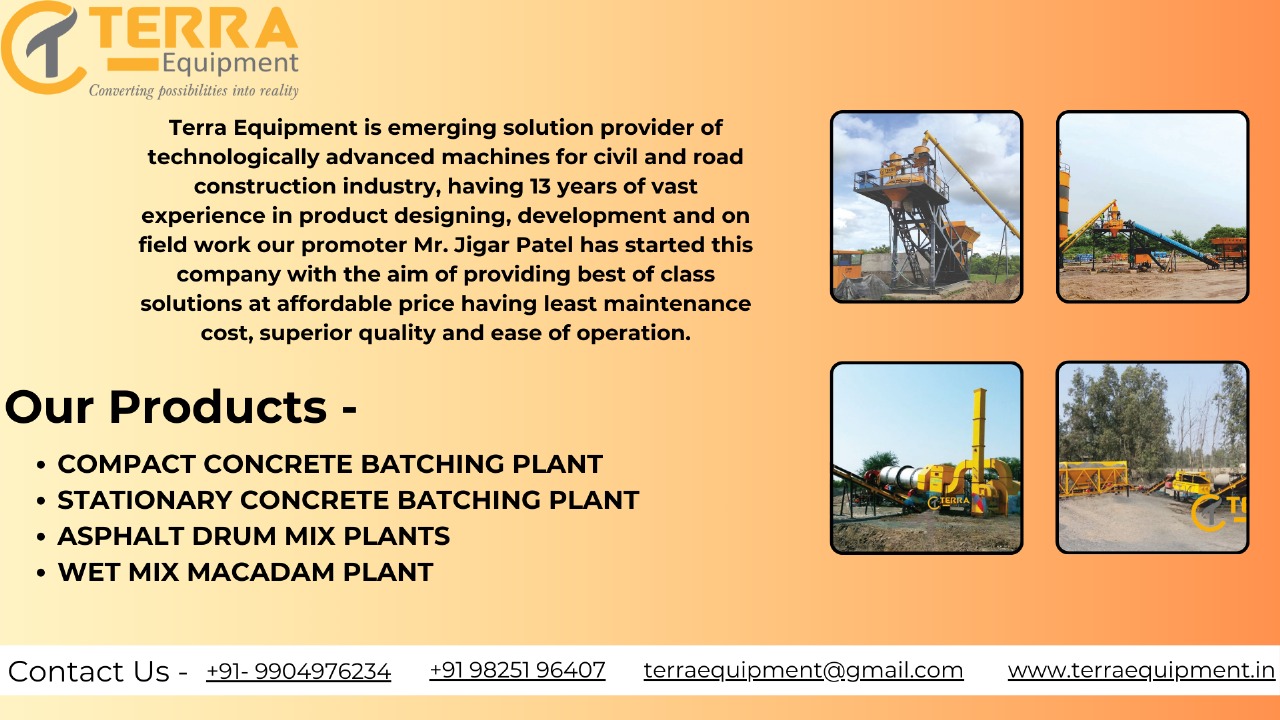Stationary Concrete Batching Plant
A StationaryConcrete Batching Plant is a central facility where concrete is mixed and
prepared in bulk for large-scale construction projects. Designed for
high-volume output, these plants are permanently installed at a fixed location
and equipped with advanced control systems, large silos, precision batching
units, and high-performance mixers. Due to their robust configuration and
automation, they ensure consistent quality, reduced operational costs, and
higher productivity, making them ideal for infrastructure, industrial, and
commercial projects.
Top 10 FAQs about Stationary Concrete Batching
Plants
- What is a stationary
concrete batching plant?
It is a fixed facility designed to mix and produce concrete in large volumes for prolonged construction operations. - How does it differ from a
mobile batching plant?
Stationary plants are permanently installed and offer higher capacity and efficiency, whereas mobile plants can be relocated and are ideal for smaller or temporary jobs. - What capacities are
available for stationary batching plants?
Typically ranges from 30 m³/hr to 200 m³/hr depending on the model and configuration. - What are the main
components?
Aggregate batching machine, cement silos, conveyor belts, weighing system, mixer unit, control system, and water dosing unit. - Is it fully automatic?
Most modern plants come with fully automatic control systems, although semi-automatic options are also available. - What type of mixers are
used?
Twin-shaft mixers, planetary mixers, or pan mixers, depending on the consistency and quality of concrete required. - How is the quality of
concrete maintained?
Through automated controls, accurate batching, and continuous monitoring of mixing ratios and time. - What is the installation
time?
Installation can take 2 to 4 weeks, depending on the plant size and site conditions. - Is it suitable for RMC
(Ready Mix Concrete) businesses?
Absolutely! Stationary batching plants are the backbone of RMC businesses due to their consistency and output capacity. - What certifications or
standards should the plant comply with?
Compliance with ISO, CE, and local construction norms (like ASTM or IS standards) is essential.
Applications of Stationary Concrete Batching Plant
- Large-scale infrastructure
projects
(highways, bridges, dams)
- Commercial and residential
buildings
- Airport and railway projects
- Ready Mix Concrete (RMC)
supply
- Industrial construction
- Precast concrete
manufacturing
- Power plant and energy
projects
- Water treatment plants
- Smart cities and urban
development
- Mega malls, stadiums, and
auditoriums
Benefits of Stationary Concrete Batching Plants
- High Production Capacity – Capable of delivering
massive volumes of concrete continuously.
- Superior Quality Control – Automated systems ensure
accurate mixing ratios and consistency.
- Cost Efficiency in Long-Term
Projects –
Reduced per-cubic-meter cost over time.
- Customizable Configuration – Tailored designs to meet
project-specific needs.
- Durability and Longevity – Built for 24/7 operations
over many years.
- Environmentally Friendly – Modern plants include dust control and wastewater recycling systems.
- Low Operational Downtime – Highly reliable equipment
ensures smooth and consistent operation.
- Better Inventory Management – Real-time monitoring of
cement, aggregates, and water usage.
- Ideal for Automation and IoT
Integration –
Supports digital project management.
- Boosts Project Speed – Ensures uninterrupted
concrete supply for fast-paced construction schedules.
Contact us more details
Call: +91
98251 96407 +91- 9904976234
Email: terraequipment@gmail.com
Address: Survey No- 231, Dediyasan Village,
Opp Lilaba Weigh Bridge , Mehsana -384002 Gujarat

